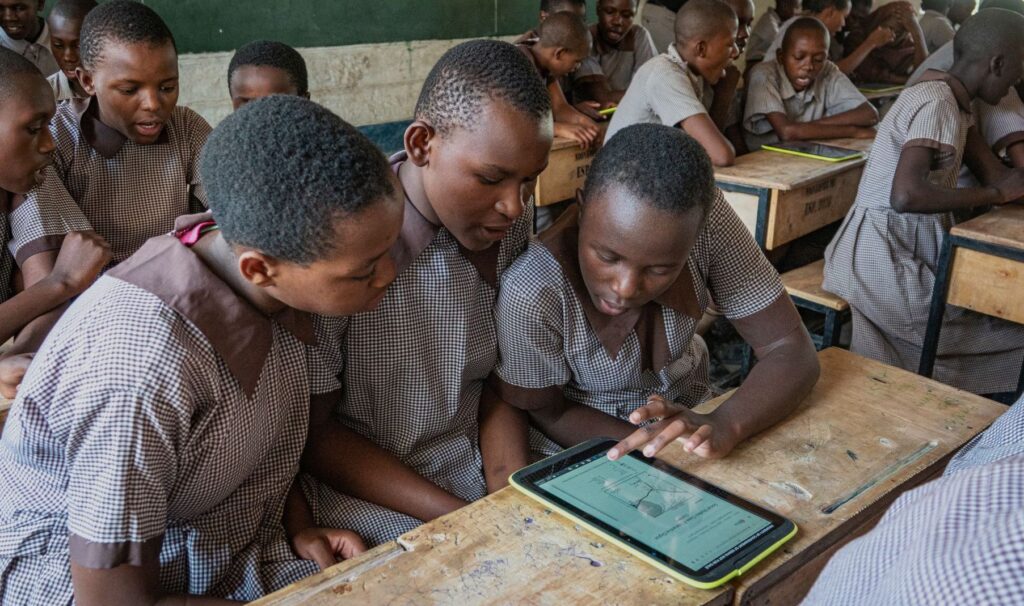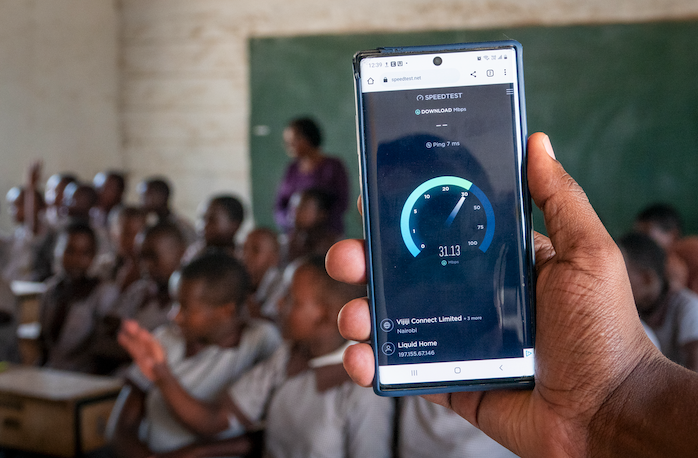“Life before the internet was really chaotic. It was really bad, and it was something I wouldn’t wish to go back to,” head teacher Peris Gaturi said of the time before her school was connected to the internet.
Gaturi leads Noonkopir Primary School in Kajiado county in Kenya. Despite being only 30 kilometers away from Kenya’s capital Nairobi, the lack of internet access meant that her school’s 1,300 students were isolated from the world of learning opportunities available online.
Through the support of Giga and its partners in Kenya, Noonkopir Primary School was finally connected to the internet – and the impact was clear. With the internet at their fingertips, teachers had access to a wealth of teaching and learning resources that kept their students engaged.
A year after being connected to the internet, the school’s academic results rose by almost 10 per cent.
The school also had an increase in student enrolment, with some grade levels doubling in number. While there are many reasons behind these remarkable achievements, Gaturi believes that the internet played a big part.
The internet arrived at the right time at Noonkopir, as Kenya has undertaken a massive shift in its educational system. Since 2017, the government has introduced reforms such as rolling out the new Competency Based Curriculum that places a strong emphasis on competencies and prepares its students for a dynamic, digital future.
The internet is an essential tool in this project. Textbooks have started to include links to online resources that children can access to enhance their learning.

(©UNICEF/Kenya/2023)

(©UNICEF/Kenya/2023)
“The internet has helped us learn many things including those that the teachers don’t teach in class. Like map reading, for example. I want to say that the internet is also helping other youths - you can get news even when you’re far. Because not all people can get news wherever they have. When I have my phone, I can just connect to the internet and check what is going on in the world and find out what’s happening. I’m happy that we have the internet in the school.”
Jenny,
8th grade student, Noonkopir Primary School
Kenya’s education reform also meant that processes like teacher and student assessments are now digitized and submitted online by school administrators, allowing the Government to have a real-time picture of school performance across the country.
But transmitting these results could be challenging for schools without internet access.
Gaturi experienced this firsthand, and she described it as chaotic. It was normal for her and Noonkopir’s teachers to spend their own money to use the internet in cyber cafes, and they would often miss their deadlines as a result. Seemingly simple administrative processes took a lot of time, money and energy for Gaturi and her fellow teachers.

(©UNICEF/Kenya/2023)
With the internet now available at school, Gaturi can focus on the most important thing a school leader has to do: creating the best learning environment for their teachers and students.
“Today, now that the internet is just there at the click of a button, if I get five minutes, I’m able to do an appraisal for a teacher, and then tomorrow I’ll do another one. So, I don’t have to wake up in the middle of the night as I used to do before. It was really bad before. Today, the teachers just normally come to the school to finish their administrative work simply because the internet here is reliable,” she said.
Noonkopir Primary School is just one of the many schools connected in Kenya by Giga and its partners.
But there are still a lot of schools to connect. In 2023, Giga also supported the government in mobilizing EUR 9.9 million from the European Union. Around US$4.7M of these funds have been earmarked to connect ~1,000 schools in Kenya.

(©UNICEF/Kenya/2023)
“The Internet has changed the way we teach. We’ve gone a long way from the normal use of textbooks. First, our pupils are able to explore. Secondly, it is fun. Third, it opens our pupils’ minds. Their minds are broadened, because they can access any information from any country. Being a social studies teacher, the internet is relevant to my lessons as I teach about the world. Through the internet, my students are able to explore.”
Joseph Waweru,
Teacher, Noonkopir Primary School

